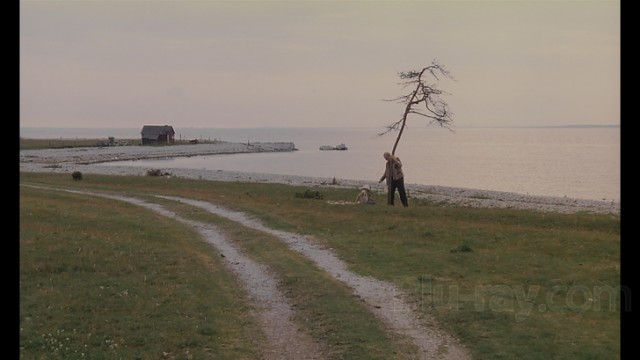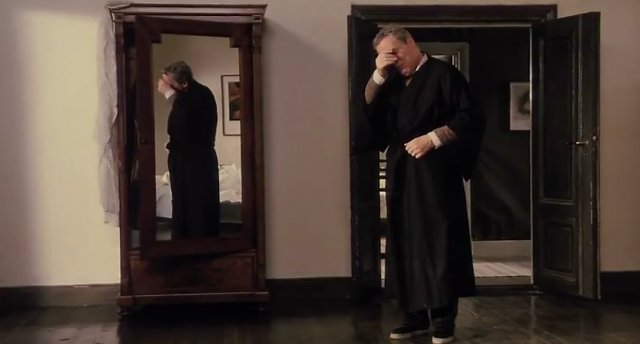
A man and his son plant a dead tree they hope will grow in Andrei Tarkovsky’s final film, THE SACRIFICE
THE SACRIFICE (OFFRET) (Andrei Tarkovsky, 1986)
Museum of Arts & Design
2 Columbus Circle at 58th St. & Eighth Ave.
Friday, August 21, $10, 7:00
Series continues Friday nights through August 28
212-299-7777
madmuseum.org
 Andrei Tarkovsky’s final film, The Sacrifice, completed shortly before his death in 1986 of cancer at the age of fifty-four, serves as a glorious microcosm of his career, exploring art, faith, ritual, devotion, and humanity in uniquely cinematic ways. Made in Sweden, the film has many Bergmanesque qualities: Bergman’s longtime cinematographer, Sven Nykvist, shot the film; the production designer is Anna Asp, who won an Oscar for her work on Fanny and Alexander; Bergman’s son Daniel served as a camera assistant; and the star is Erland Josephson, who appeared in ten Bergman films as well as Tarkovsky’s previous feature, the Italy-set Nostalghia. Josephson plays Alexander, a retired professor and former actor living in the country with his wife, the cold Adelaide (Susan Fleetwood), his stepdaughter, Marta (Filippa Franzén), and young son, Little Man (Tommy Kjellqvist), who cannot speak after a recent throat operation. It is Alexander’s birthday, and the family doctor, Victor (Sven Wollter), has come to visit, along with the odd local postman, Otto (Allan Edwall), who explains, “I collect incidents. Things that are unexplainable but true.” Also on hand are the two maids, Maria (Guðrún Gísladóttir), who Otto believes is a witch, and Julia (Valérie Mairesse). Alexander states early on that he has no relationship with God, but when a nuclear holocaust threatens, he suddenly gets down on the floor and prays, offering to sacrifice whatever it takes in order for him to survive, leading to a chaotic conclusion that is part slapstick, part utter desperation.
Andrei Tarkovsky’s final film, The Sacrifice, completed shortly before his death in 1986 of cancer at the age of fifty-four, serves as a glorious microcosm of his career, exploring art, faith, ritual, devotion, and humanity in uniquely cinematic ways. Made in Sweden, the film has many Bergmanesque qualities: Bergman’s longtime cinematographer, Sven Nykvist, shot the film; the production designer is Anna Asp, who won an Oscar for her work on Fanny and Alexander; Bergman’s son Daniel served as a camera assistant; and the star is Erland Josephson, who appeared in ten Bergman films as well as Tarkovsky’s previous feature, the Italy-set Nostalghia. Josephson plays Alexander, a retired professor and former actor living in the country with his wife, the cold Adelaide (Susan Fleetwood), his stepdaughter, Marta (Filippa Franzén), and young son, Little Man (Tommy Kjellqvist), who cannot speak after a recent throat operation. It is Alexander’s birthday, and the family doctor, Victor (Sven Wollter), has come to visit, along with the odd local postman, Otto (Allan Edwall), who explains, “I collect incidents. Things that are unexplainable but true.” Also on hand are the two maids, Maria (Guðrún Gísladóttir), who Otto believes is a witch, and Julia (Valérie Mairesse). Alexander states early on that he has no relationship with God, but when a nuclear holocaust threatens, he suddenly gets down on the floor and prays, offering to sacrifice whatever it takes in order for him to survive, leading to a chaotic conclusion that is part slapstick, part utter desperation.
Although it has a more focused, direct narrative than most of Tarkovsky’s other works, The Sacrifice is far from a conventional story. Tarkovsky has written that it “is a parable. The significant events it contains can be interpreted in more than one way. . . . A great many producers eschew auteur films because they see cinema not as art but as a means of making money: the celluloid strip becomes a commodity. In that sense The Sacrifice is, amongst other things, a repudiation of commercial cinema. My film is not intended to support or refute particular ideas, or to make a case for this or that way of life. What I wanted was to pose questions and demonstrate problems that go to the very heart of our lives, and thus to bring the audience back to the dormant, parched sources of our existence. Pictures, visual images, are far better able to achieve that end than any words.” The film is filled with gorgeous visual images, beautiful shots of vast landscapes, of open doorways in stark interiors, of mirrors and windows, of Alexander and Little Man planting a dead tree by the edge of the ocean, and spoken language is often kept to a minimum, saved for philosophical discussions of God, Nietzsche, and home. Several scenes are filmed in long, continuous shots, lasting from six minutes to more than nine, heightening both the reality and the surrealism of the tale, which includes black-and-white memories, floating characters, and actors staring directly into the camera. Although Christianity plays a key role in the film — Tarkovsky considered himself a religious man, and the opening credits are shown over a close-up of Leonardo da Vinci’s “Adoration of the Magi” — the redemption that Alexander is after is a profoundly spiritual and, critically, a most human one as he searches for truth and hope amid potential annihilation. Winner of three awards at the Cannes Film Festival (among many other honors), The Sacrifice is screening August 21 at 7:00 as part of the Museum of Arts & Design film series “Andrei Tarkovsky, Sculpting in Time,” which runs Friday nights through August 28 and includes all seven of Tarkovsky’s masterpieces (Solaris, Stalker, Ivan’s Childhood, Andrei Rublev, The Mirror, Nostalghia, The Sacrifice) before concluding with the behind-the-scenes documentary Directed by Andrei Tarkovsky, which lends fascinating insight to the making of The Sacrifice in particular.
